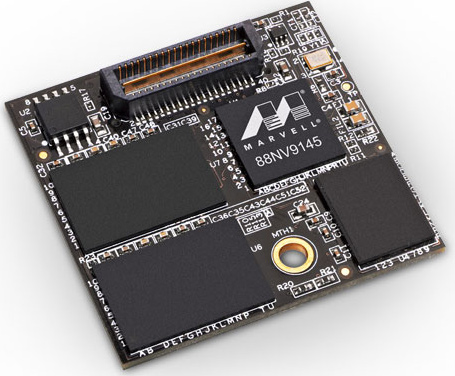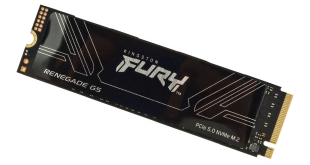Marvell has introduced two new controllers for solid-state drives that can significantly improve performance of storage for tablets, hybrid 2-in-1 devices. The new controllers will not require DRAM, which will allow making smaller solid-state storage solutions for ultra-thin computing devices.
“I believe our latest game-changing SSD controller will drive the fast deployment of a new wave of small form factor SSD solutions for the mass market mobile computing platforms,” said Weili Dai, president and co-founder of Marvell.
Marvell’s 88NV1140 and 88NV1120 controllers feature NVMe PCIe 3.0 x1 and Serial ATA-6Gb/s interfaces, respectively. The new controllers are based on two ARM Cortex R5 cores and support all modern NAND flash memory types with ONFI and toggle DDR interfaces as well as upcoming 15nm/16nm TLC NAND, 3D NAND and memory with ONFI3 and toggle 2 interfaces from various manufacturers. The new controllers sport embedded SRAM with hardware accelerators to optimize IOPS performance. Both new solutions feature Marvell’s third-generation NANDEdge error-correction technology. The chips are made using 28nm process technology.
“I am very pleased to see Marvell’s leadership and our long track record of invention and innovation including the world's first DRAM-less NVMe SSD controller and the industry’s most advanced LDPC technology enabling the latest TLC and 3D NAND flash memory,” said Mr. Dai.
Discuss on our Facebook page, HERE.
KitGuru Says: Thanks to strong performance, the new controllers will significantly improve storage solutions for ultra-portable devices, something that will be especially important for 2-in-1 hybrid PCs based on Intel’s Core M “Broadwell” processors.
 KitGuru KitGuru.net – Tech News | Hardware News | Hardware Reviews | IOS | Mobile | Gaming | Graphics Cards
KitGuru KitGuru.net – Tech News | Hardware News | Hardware Reviews | IOS | Mobile | Gaming | Graphics Cards




does less DRAM = less power consumed? that’s what im interested in 🙂